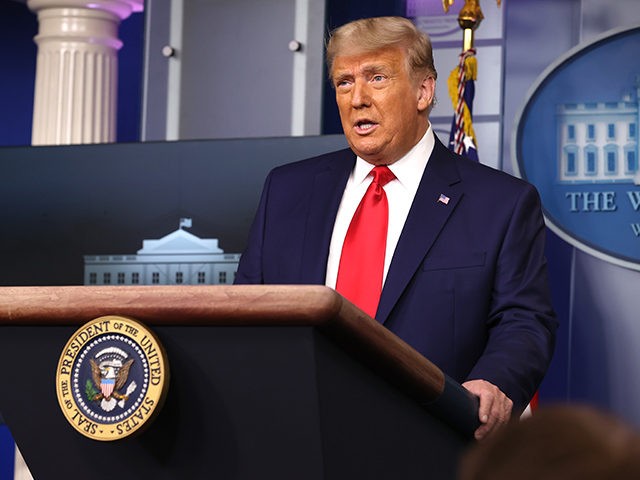President Donald Trump remains willing to take the coronavirus vaccine to signal confidence in the product, but will likely wait according to an administration official, who noted that the president has already recovered from the virus.
“I think there is something that’s up for discussion as to whether someone who’s recovered from COVID and has antibodies would necessarily be a high priority for receiving the vaccine and for the purposes of vaccine confidence,” the administration official told Breitbart News in a call with reporters Monday.
In July, Trump told Fox News medical contributor Dr. Marc Siegel that he would be more than willing to take the vaccine first, but wanted to make sure it sends the right message.
“I would absolutely if they wanted me to, if they thought it was right, I’d take it first, or I’d take it last,” he said, before contracting the virus himself in August.
At the time, Trump admitted that if he took the vaccine first his critics would call him selfish and that if he waited he would be accused by his critics of not trusting the vaccine development program.
“Either way, I lose on that one, right?” he grinned.
The Trump administration said that several “influencers” had already volunteered to get the vaccine.
“There are other sort of famous, shall we say, vaccine influencers and experts who I think have come forward and volunteered to participate in an effort to help instill public confidence, and we’re certainly considering such offers,” the official said.
Former President Barack Obama said last week he would take the vaccine, but only if Dr. Anthony Fauci said it was safe to do so.
“I may end up taking it on TV or having it filmed,” Obama said. “Just so that people know that I trust this science, and what I don’t trust is getting COVID.”
Former Presidents George W. Bush and Bill Clinton also expressed their willingness to take the vaccine live on television.
“First, the vaccines need to be deemed safe and administered to the priority populations. Then, President Bush will get in line for his, and will gladly do so on camera,” Bush’s chief of staff Freddy Ford told CNN.
“President Clinton will definitely take a vaccine as soon as available to him, based on the priorities determined by public health officials. And he will do it in a public setting if it will help urge all Americans to do the same,” Clinton’s press secretary Angel Urena said.
Former Vice President Joe Biden, after expressing doubt during the presidential campaign about the effectiveness of treatments developed during the Trump administration, has now promoted the vaccine.
“I think that my taking the vaccine and people seeing me take that vaccine is going to give some confidence,” Biden said last week.
But Trump’s situation is different, as he is among the few prominent American figures who contracted and recovered from the virus.
“I think there is an open question as to whether, ultimately, he will be one of the ones to take it on air,” the Trump administration official said. “And that’s simply a function of whether that would actually serve the desired purpose, given the fact that he’s a recovered patient.”
A Pew Research Center survey released in December showed that 60 percent of Americans say they would definitely or probably get a vaccine for the coronavirus if one were available today. That marked a nine-point jump in trust for the vaccine before the election as just 51 percent said the same in September.
Dr. Fauci continues pressing for 80 to 85 percent of the population to get vaccinated to reduce the public infection rate. He has admitted, however, that it will be difficult to get Americans to trust the vaccine.
“There is a general anti-science, anti-authority, anti-vaccine feeling among some people in this country — an alarmingly large percentage of people, relatively speaking,” Fauci said in a June interview, citing the power of the anti-vaccine movement in the United States.

COMMENTS
Please let us know if you're having issues with commenting.